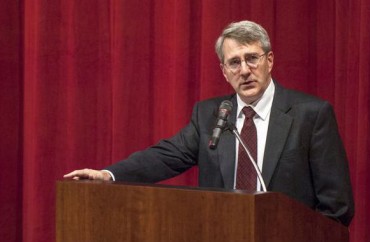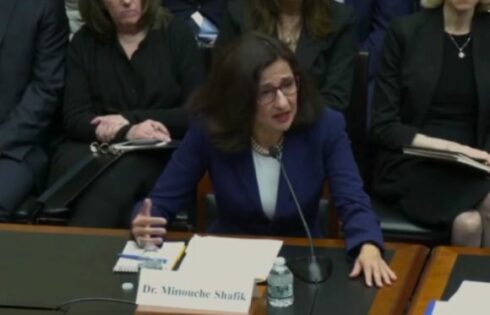
WASHINGTON – “It’s over, despair, go home.”
That was Provost David Whalen’s cheeky opening statement to a motley crew of disheveled students and crisp suits at Hillsdale College’s lecture hall near the Capitol Tuesday afternoon, who came expecting to hear his plan for “a restoration of sanity” on college campuses.
What he laid out wasn’t quite so pessimistic, and much more subversive: stop talking so much about free expression, and start talking about purpose.
Whalen is one of a handful of college leaders who can look at the academy from outside itself. Because Hillsdale takes no federal money, even in the form of student loans, it is less caught up in many of the controversies plaguing both public and private institutions.
Caused by a ‘desiccated version of Christianity’
The main difference between today’s student protesters and their 1960s counterparts – other than their disinterest in arson and dependence on “lattes and cappuccinos” – is they don’t “pretend to defend” free expression, Whalen said.
The provost sees merit in a handful of theories about how students got this way:
The “spoiled youth thesis” that young people have “no real apprehension … of the labor necessary actually to succeed”
The “lack-of-law-and-order thesis” that they don’t believe obligations and contracts are binding, evidenced by the University of Missouri football players who went on strike (but kept their scholarships because revoking them “means a losing season for the football team. Hmm”)
The “tenured radical thesis” that academics are reaping what they’ve sown and the university is “collapsing under its own weight”
The “cultural origins” theory that being a victim grants a person “special access to political and cultural capital,” borne of decades of “cultural valorization” of victimhood
Poor educational standards: Demands by student activists, Ivy League and otherwise, show their “execrable” writing, a particular offense for the English professor Whalen.
Thanks to the nearly 60 @Hillsdale alums who came to out to see Dr. Whalen last night! #Hillsdalealums pic.twitter.com/C0rOAY4QTE
— Hillsdale in DC (@HillsdaleInDC) March 23, 2016
The root cause of the valorization of victimhood is a “desiccated version of Christianity,” Whalen told a student questioner. The religion emphasizes the inherent dignity of persons “as” persons, as opposed to the Roman celebration of “martial excellence.”
But when activists take God out of personal dignity, the result is the “sentimentalization” of the weak and downtrodden.
Asked by another student about universities’ failure to enforce their own policies, Whalen blamed both “cowardice” and “decades-old sympathy” by administrators who believe in students’ call for social revolution.
And the restoration of campus sanity can only take place through a “non-frontal assault,” he said.
Free expression as an end is no good
Because student activists want to “wrest control of culturally important” institutions from those they think control them, they associate free expression with a “quaint” social order.
That association is apt, Whalen said: For the past century, free expression has been made a “demigod” and considered a “self-sustaining good,” an end in itself. But such a view is out of whack with the academy’s more recent skepticism that truth is knowable at all.
Great to hear from Dr. Whalen about student movements and the purpose of education at the @KirbyCenter. @Hillsdale pic.twitter.com/urE7qEKcnH
— Vivian Jones (@Vivian_E_Jones) March 22, 2016
Defenders of debate must “restore the intellectual telos to discourse itself” and emphasize that it’s the means to an end, the “continued vigorous grasp of the real and the true,” the “three dimensional” as opposed to the abstract, Whalen said.
The commodification of higher education is not only a problem for self-described liberals: It convinces parents and students that they are buying a good that is “primarily oriented to the acquisition of skills” intended for material advantages, and it’s an “autonomous, solitary activity” that happens in classrooms purely for the sake of efficiency.
Only when the true purpose of higher ed is explained – to “perfect a personal endowment of mind” – will students start to value free expression without even thinking about it. They must be convinced that learning can only happen in a “collegial setting” at its most literal – through “unscripted and unplanned conversations with others,” Whalen said.
Asked how Robert Putnam’s book on waning social institutions Bowling Alone fit into his argument, Whalen said “it’s right at the heart of it.” Making the acquisitions of skills the point of higher ed creates “the desiccated, autonomous individual” who is around others but not part of them.
Like The College Fix on Facebook / Follow us on Twitter
IMAGE: Hillsdale College Kirby Center/Twitter





Please join the conversation about our stories on Facebook, Twitter, Instagram, Reddit, MeWe, Rumble, Gab, Minds and Gettr.